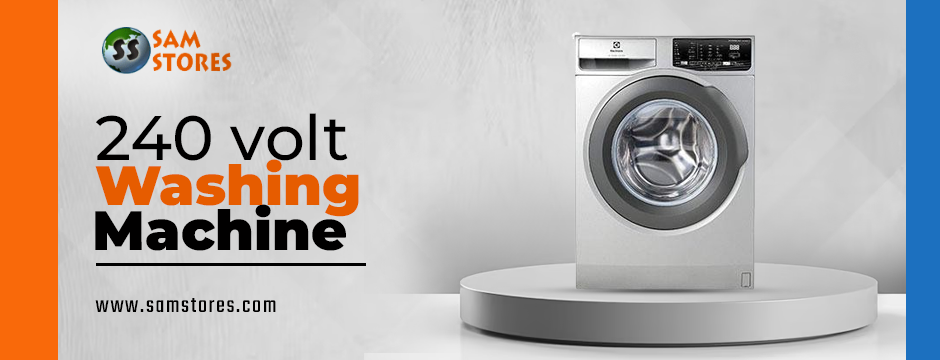Selecting the appropriate capacity for your washing machine is crucial to ensure efficient laundry cycles that meet the needs of your household. With the prevalence of 240 Volt Washing Machines, understanding capacity considerations becomes even more imperative. Through this guide, you will come to delve into the factors to consider when choosing the right capacity for your 240-volt washing machine to optimize performance and convenience.
Understanding Capacity in Washing Machines
Capacity refers to the volume of laundry that a washing machine can effectively clean in a single cycle. It’s typically measured in cubic feet or pounds. The capacity of a washing machine directly influences how much laundry you can wash at once, affecting factors such as cycle duration, water usage, and energy efficiency. Choosing the right capacity ensures that you can efficiently manage your laundry needs without overloading the machine or wasting resources.
Household Size and Laundry Frequency
One of the primary factors to consider when determining washing machine capacity is the size of your household and your typical laundry frequency. Larger households with more family members generally require washing machines with higher capacities in order to handle the higher amount of laundry generated. Similarly, households with frequent laundry needs may benefit from larger-capacity machines to minimize the frequency of laundry cycles and optimize efficiency.
Types of Loads and Fabric Care
Consider the types of loads you typically wash and the specific care requirements of different fabrics. For households that frequently wash bulky items like bedding, comforters, or large towels, a washing machine with a larger capacity can handle these loads more effectively without overcrowding the drum. Additionally, if you frequently wash delicate fabrics that require gentle treatment, opting for a washing machine with a smaller capacity may allow for more precise control over the washing process and reduce the risk of damage to delicate garments.
Available Space and Installation Considerations
Before selecting a washing machine capacity, assess the available space in your laundry room or designated washing area. Larger-capacity washing machines may require more floor space or a larger footprint to accommodate their size. Ensure that the chosen machine can fit comfortably in the allocated space and allow for adequate clearance for installation and maintenance. Additionally, consider factors such as door clearance and access to utilities when planning for the installation of your washing machine.
Energy Efficiency and Water Usage
Choosing a washing machine with an appropriate capacity can contribute to energy efficiency and water conservation. Overloading a washing machine with laundry can reduce its efficiency and require longer wash cycles, leading to increased energy consumption. By selecting a machine with a capacity that matches your household’s needs, you can optimize energy usage and minimize water waste, ultimately reducing utility costs and environmental impact.
Budget Considerations and Long-Term Investment
When evaluating washing machine capacities, consider your budget and long-term investment goals. While larger-capacity machines may offer greater convenience for larger households, they often come with higher price tags. Assess your budget constraints and weigh the upfront cost of the washing machine against its long-term benefits and potential savings in energy and water usage. Additionally, consider factors such as warranty coverage and maintenance costs to ensure that your chosen washing machine provides value over its lifespan.
Comparing Standard and High-Capacity Models
240 Volt Washing Machines are available in a range of capacities, from standard to high-capacity models. Standard-capacity machines typically offer capacities ranging from 2.5 to 3.5 cubic feet, suitable for smaller households or individuals with moderate laundry needs. In contrast, high-capacity machines can accommodate larger loads, with capacities exceeding 4.0 cubic feet, making them ideal for larger households or those with frequent laundry requirements. Evaluate your household’s specific needs and preferences to determine which capacity range best aligns with your laundry habits and lifestyle.
Optimizing Performance and Efficiency
Ultimately, choosing the right capacity for your washing machine is essential for optimizing performance and efficiency in your laundry routine. Consider factors such as household size, laundry frequency, types of loads, available space, energy efficiency, and budget constraints when selecting the ideal capacity. By making an informed decision based on these considerations, you can ensure that your washing machine meets your household’s needs while delivering reliable and efficient performance for years to come.
Bottom Line
Selecting the right capacity for your 240 Volt Washing Machines is a crucial decision that impacts the efficiency and effectiveness of your laundry routine. By considering factors such as household size, laundry frequency, types of loads, available space, energy efficiency, and budget constraints, you can make an informed choice that meets your specific needs and preferences. Whether opting for a standard-capacity or high-capacity model, prioritizing the appropriate capacity ensures optimal performance and efficiency, enhancing the overall laundry experience for you and your household.
Sam Stores stands as a premier destination for household electronic appliances and equipment, offering top brands at competitive prices. With a seamless shopping experience, customers can conveniently place orders online, by phone, fax, or email. Trust us for quality products and hassle-free transactions, ensuring satisfaction with every purchase. Visit us today and order your preferred washing machine now!
